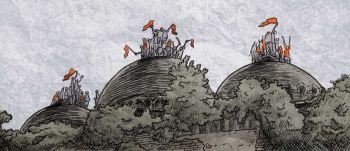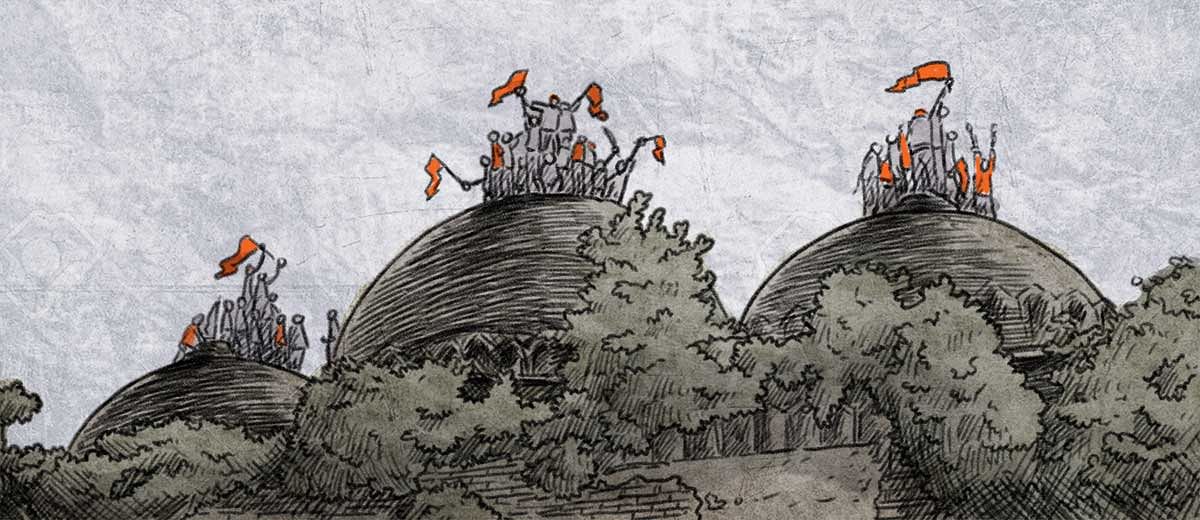
.jpg) Mathew John
Mathew John

The Hindutva project was kick-started with a brutal transgression of the law. On the evening of December 6, 1992, I was in the Railway club, Guwahati when news broke that the Babri Masjid had been demolished. There burst forth an ecstasy of delight; card tables and the badminton court were abandoned as my colleagues congratulated one another with the kind of excitement seen when India beats Pakistan in cricket. But while they rejoiced, I was numb with shock and dismay.
The joyous response to a heinous act of desecration most poignantly demonstrated the enormous divide that separated a large section of Hindus and minorities. For me, particularly distressing was that this noxious animosity was not restricted to the lumpen elements who brought down the Masjid but was pervasive even among the denizens in board-rooms and the babu kingdom. I realized with sinking heart that when the Babri Masjid was destroyed, so was our identity as a secular nation. This wanton act of vandalism symbolized the dissolution of the idea of India envisaged by our founding fathers.
More than anything else, the barbaric act demonstrated that the strongest force in India was no longer secularism with its appendages of pluralism and inclusiveness but the ethnocentric ideology of Hindutva that upholds the supremacy of Hindus and purveys a pathological distrust of Muslims and Christians. Cocking a snook at the Constitution and the law, the kar sevaks and their Sangh Parivar handlers - votaries of a muscular Hindu nationalism - brought down the Babri Masjid and provided the impetus to the inexorable march towards a Hindu Rashtra. It was a dark night for democracy!
Shortly before his death, Jawaharlal Nehru assessed the threat to the nation’s security thus: “The danger to India, mark you, is not communism. It is Hindu right-wing communalism.” How prophetic have been his words! While it is true that the communalism of one group feeds on the communalism of the other, it is undeniable that only majority communalism has the power to alter the nature of the Indian polity by subverting the basic principles of democracy and secularism. His warnings have gone unheeded and today the country is on the brink.
It is important to remember that at the time of Independence, the citizens of India, mainly Hindu, had outright rejected the communal for the secular. The values that embellish the Preamble of our Constitution were quite simply the will of the majority. This was an ideal that the country aspired for, but given the historical animosity between the two communities and the trauma of Partition, it was always going to be a difficult task. Even as the nation wrestled with the problems of hunger, disease and unemployment, the fundamentalist forces, Hindu and Muslim, were engaged in stymieing all attempts at cultural syncretism between the communities. Tragically, they have had unmitigated success in polarizing our society on communal lines.
The trishul-waving kar sevaks atop the Babri Masjid dome represented a deviant religious militancy that undermined the country’s core values and transformed the land of Buddha and Gandhi that was tolerant of all religions into a deeply polarized majoritarian State. At the ideological plane, the cultural eclecticism that marked the world view of Adi Shankaracharya and Gandhi was subsumed by the divisive, insular nationalism propagated by M S Golwalkar and Veer Savarkar who stressed unity among Hindus, Sikhs, Buddhists and Jains, to the exclusion of Muslims and Christians whose loyalty to the nation was suspect.
William Hazlitt famously observed that the garb of religion is the best cloak for power. The Sangh Parivar’s calculated induction of religion into the political arena with the clear intent of bestowing divinity to their politics has been hugely successful. Playing on the traditional Hindu’s belief that sadhus have a heightened vision not only about spiritual but also temporal affairs, the ‘holy men’ have been positioned at the vanguard of the movement whose ultimate goal is the establishment of a Hindu Rashtra. A venom-spewing Yogi is the head of the largest State in the country. By advocating greater commitment to religion, by preaching religious and cultural exclusivity, the clergy have made the common man acutely conscious of his religious identity. Skilfully using rituals to keep the Hindu ranks together, Valmiki and Ravidas pujas are conducted for the benefit of lower castes. Today the Sangh Parivar, despite mangling a great religious tradition of pluralistic beliefs, can justifiably claim to identify with and represent the collective will of a large section of Hindus.
Even on the day that the Babri Masjid was torn down it was palpably obvious that no power on earth would be allowed to rebuild it, such was the visible might of those who engineered its destruction. It would be no exaggeration to state that on the ruins of this structure was built the irresistible political juggernaut of the Saffron brigade. The Ram Janmabhoomi movement which culminated in the Babri destruction resulted in a massive boost in the political fortunes of the BJP particularly in the Hindi belt and the West. This was reflected in the 120 Lok Sabha seats that the BJP won in 1991 and the 161 seats with alliance partners that it got in 1996, compared with the measly 2 seats secured in the 1984 election.
Two decades later, the BJP has become the nation’s hegemon, the undisputed power at the Centre and ruling in several States. In its wake, the social ecosystem is steaming with schismatic tensions and the rhetoric of hate. Gratuitous everyday cruelty manifested in lynchings, ghar wapsi, beef vigilantism, love jihad and the crushing of dissent plays out under the benign gaze of the State.
Even the last bastion of our democracy -the Supreme Court- has bowed to majoritarian sentiment. The site of the demolished mosque has been bestowed to the deity “Ram Lalla” in defiance of the basic principles of justice. Justice Oliver W Holmes had famously observed that “Courts are courts of law and not courts of justice.” Sadly, in its Ayodhya verdict, our Supreme Court has neither delivered justice nor adhered to the fundamental tenets of the law. Instead, Aastha or faith of the majority community has prevailed.
The demolition of the Babri Masjid was that seminal moment in our national life that irretrievably changed the trajectory of our history. We have cast off the idea of India as a united, multicultural country with common goals and aspirations, a shared history and on a joint search for a better future for all. In its place we have Hindutva as the unofficial ideology of the State. Jai Shri Ram!
(The writer is a retired civil servant)